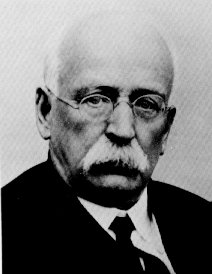
Back إبنيزر هوارد Arabic ابنيزر هوارد (مهندس) ARZ Ebenezer Howard Catalan Ebenezer Howard Czech Ebenezer Howard Danish Ebenezer Howard German Ebenezer Howard Esperanto Ebenezer Howard Spanish Ebenezer Howard Basque Ebenezer Howard Finnish
Sir Ebenezer Howard | |
|---|---|
 | |
| Born | 29 January 1850 London, England |
| Died | 1 May 1928 (aged 78) Welwyn Garden City, Hertfordshire, England |
| Known for | Founder of the garden city movement in England |
| Notable work | To-Morrow: A Peaceful Path to Real Reform |
| Spouses |
Edith Annie Hayward (m. 1907) |
| Relatives | Geoffrey Howard (grandson) Una Stubbs (great-granddaughter) Christian Henson (great-great-grandson) |
Sir Ebenezer Howard OBE (29 January 1850[1] – 1 May 1928)[2] was an English urban planner and founder of the garden city movement, known for his publication To-Morrow: A Peaceful Path to Real Reform (1898), the description of a utopian city in which people live harmoniously together with nature. The publication resulted in the founding of the garden city movement, and the building of the first garden city, Letchworth Garden City, commenced in 1903.
The second true Garden City was Welwyn Garden City (1920) and the movement influenced the development of several model suburbs in other countries, such as Forest Hills Gardens designed by F. L. Olmsted Jr. in 1909,[3] Radburn, New Jersey (1923), Pinelands, Cape Town, and the four Suburban Resettlement Program towns of the 1930s, Greenbelt, Maryland, Greenhills, Ohio, Greenbrook, New Jersey, and Greendale, Wisconsin.[4]
Howard aimed to reduce the alienation of humans and society from nature, and hence advocated garden cities[5] and Georgism.[6][7][8] Howard is believed by many to be one of the great guides to the town planning movement, with many of his garden city principles being used in modern town planning.[5][9]
- ^ Penguin Pocket On This Day. Penguin Reference Library. 2006. ISBN 978-0-14-102715-9.
- ^ (1933) Enciklopedio de Esperanto Archived 8 July 2007 at the Wayback Machine
- ^ Klaus, Susan (2002). A Modern Arcadia. The University of Massachusetts Press. pp. Preface. ISBN 978-1-55849-314-8.
- ^ Stern, Robert (1981). The Anglo American Suburb. London: Architectural Design Profile. pp. 84, 85. ISBN 978-0-312-03717-8.
- ^ a b Clark, B 2003, 'Ebenezer Howard and the marriage of town and country' Archived 11 May 2016 at the Wayback Machine, Archives of Organizational and Environmental Literature, vol. 16, no. 1, pp. 87–97.
- ^ Steuer, Max (June 2000). "REVIEW ARTICLE A hundred years of town planning and the influence of Ebenezer Howard". The British Journal of Sociology. 51 (2): 377–386. doi:10.1111/j.1468-4446.2000.00377.x. PMID 10905006.
- ^ Meacham, Standish (1999). Regaining Paradise: Englishness and the Early Garden City Movement. Yale University Press. pp. 50–53. ISBN 978-0300075724. Retrieved 5 August 2014.
- ^ Purdom, Charles Benjamin (1963). The Letchworth Achievement. p. 1. Retrieved 5 August 2014.
- ^ March, A 2004, 'Democratic dilemmas, planning and Ebenezer Howard's Garden City', Planning Perspectives, vol. 19, pp. 409–433.